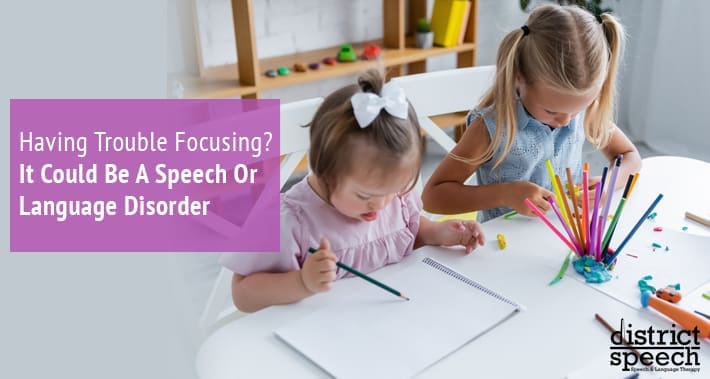
Many of the tasks we perform on a day to day basis require some level of focus or concentration.
This is true whether you are a child or an adult.
Children in school face a lot of circumstances where they need to focus or concentrate.
This could mean listening to their teacher speak and then having to complete tasks, assignments, or worksheets.
Adults also experience many circumstances where they might need to focus as well.
For example, when you drive to work, as you sit through meetings and presentations, or while reading important reports and documents required for your job.
Difficulty with concentration or focus can hinder academic performance and workplace success.
However, if this is something you struggle with, there may be an underlying reason you’re having these issues.
At our DC speech therapy clinic, we can help you determine if your lack of focus is due to an underlying condition such as a speech or language disorder.
Today we’re going to have a look at some of the conditions which can lead to a decreased ability to concentrate.
Keep reading to learn more.
What Does It Mean To Have Trouble Focusing?
An inability to focus or concentrate can lead to difficulty completing tasks.
It’s sort of like sitting through a boring presentation when you know you have tickets to a concert after.
You can’t focus on or take in what’s happening right in front of you.
Time drags on and you’d rather be anywhere else.
Having difficulties with focusing and concentration can feel like that, except it happens every day with multiple types of tasks.
This can have an impact on your success in school, or in the workforce.
Reading is one example of this.
If you struggle to concentrate on reading for extended periods of time, it could impact you academically or your performance at work.
It may also make it difficult to perform tasks such as driving.
An inability to focus can also impact your decision making ability.
When you are making decisions, especially important ones, you need to be able to focus on and weigh all options.
If you are having difficulty concentrating, you may not be able to do this effectively.
What Are The Symptoms Of Having Trouble Focusing?
An inability to focus may present itself in some of the following ways:
- Difficulty concentrating
- Finding it takes a lot of physical and mental energy to maintain focus
- Short term memory issues
- Making careless mistakes
- Fidgeting, having trouble staying still
- Having trouble with complicated tasks
- Brain fog
- Losing things, or not being able to remember where you put things
- Indecisiveness
What Are The Causes Of Having Trouble Focusing?
In many cases, difficulty focusing can be linked to an underlying condition, including a speech or language disorder.
Recognizing this is important.
Once a cause can be found for your lack of focus, then you can find solutions and strategies to stay on track.
If your difficulty focusing is a result of an underlying condition, however, speech therapy for adults as well as pediatric speech therapy can help, depending on your age.
Let’s have a look at some of the disorders which could be responsible for an inability to concentrate.

1. ADD/ADHD
ADD stands for attention deficit disorder, while ADHD is short for attention deficit hyperactivity disorder.
These conditions are now considered one and the same however, and are just called ADHD.
So, the fact that someone with ADHD may have trouble with focus or concentration is right there in its name – “attention deficit”.
People with ADHD often have difficulty paying attention.
They may also focus on the “wrong” things, and struggle to shift their attention.
If you have ADHD, you might know that people with ADHD tend to prefer to multitask.
People with ADHD often jump around between tasks, as well.
As one task becomes boring, your brain will shift towards something else that feels more interesting.
You may also have difficulty reading.
As well, there’s a connection between ADHD and stuttering – up to 50% of people who stutter also have ADHD.
Speech therapy for ADHD can help with your child’s executive function skills.
This basically means their ability to turn a thought into an action and go do it.
Improving executive functioning skills for people with ADHD can help improve focus, especially through improving time management.
RELATED: Frequently Asked Questions About ADHD
2. Stroke
A stroke is a type of brain injury.
It occurs as the result of an interruption of blood to the brain.
Because of this impact on the brain, issues with functions such as memory, thinking, and concentration are extremely common following a stroke.
This is especially true if the part of the brain which controls cognition was affected by the stroke.
If you’ve had a stroke, you may experience difficulty with switching between tasks, multitasking, processing information, or focusing on a single task.
These are all signs that your stroke has affected your concentration.
However, some of these challenges can be overcome with appropriate therapies.
Speech therapy is an important part of stroke recovery as a result, especially if it results in aphasia.
3. Down Syndrome
Down syndrome is a chromosomal condition which occurs when a child is born with an extra copy of their twenty first chromosome.
It can result in developmental delays, speech impairment, and social differences.
Children with Down syndrome may exhibit impulsive behavior and limited attention spans.
A likely reason for this is actually related to the thyroid.
Often, people with Down syndrome have an underactive thyroid.
This can cause hypothyroidism, which can be linked to decreased concentration.
In addition to addressing thyroid imbalances, speech therapy for down syndrome can also help address some impulse and focus challenges, along with improving speech and communication.
4. A Hearing Impairment
Individuals experiencing hearing loss or impairment often need to concentrate a lot harder than others in order to follow along with conversations or other things going on around them.
When you can’t hear as well, you have to focus harder in order to listen to things that other people have no problem with.
You might also need increased concentration to decipher important sounds from background noise.
The mental energy required simply to follow along in conversations can lead to cognitive overload.
This often means information isn’t stored, and may make it more difficult to focus on what others are saying.
In addition, having a hearing impairment means people are more likely to miss details of what is being told to them.
If you experience hearing loss, you may also have difficulty keeping focus, particularly in noisy environments.
If your child is hearing impaired, speech therapy will take that into account.
Book Your Appointment With District Speech Today
Have you been finding it more and more difficult to focus on your school or work?
Perhaps you’ve noticed a difference since shifting more to online meetings or classes during the pandemic, and wonder if there might be more to it than just “Zoom fatigue”.
If you’re a parent, maybe you’re noticing signs of a lack of focus in your child and want to get them help so they don’t get frustrated and bored of school.
Whatever the age and stage of life you’re at, we’re District Speech, serving Washington DC and the surrounding area, and we can help.
If you, or your child, is having trouble with focus, at school, work, or any other area of life, contact us today to set up a consultation.
We can help you determine if there is an underlying reason for your inability to focus and come up with a treatment plan and strategies to help you address it.
Book your appointment with District Speech today.
1300 I St NW, Suite 400 E,
Washington, DC 20005
- https://g.page/districtspeech
District Speech and Language Therapy specializes in speech therapy, physical therapy, and occupational therapy solutions, for both children and adults, in the Washington D.C and the Arlington Virginia areas.